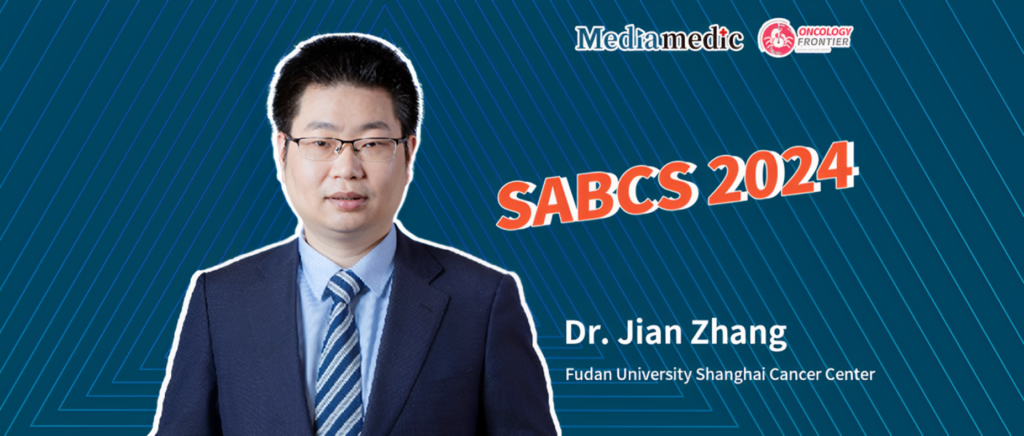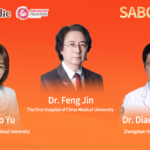
Editor's Note: From December 10–13, 2024, the 47th San Antonio Breast Cancer Symposium (SABCS) took place in San Antonio, USA. As one of the largest and most prestigious gatherings in breast cancer research, SABCS showcased cutting-edge developments from the past year, including research breakthroughs, clinical practice insights, treatment advances, and technological innovations. Among these, studies led or co-authored by Dr. Jian Zhang’s team from Fudan University Shanghai Cancer Center were prominently featured. Following the conference, Oncology Frontier invited Dr. Jian Zhang to share insights from their team’s research.Oncology Frontier: The Fudan oncology team presented several studies at this year’s SABCS. Could you summarize the key innovations or groundbreaking findings from your research?
Dr. Jian Zhang: The SABCS is an annual global event that attracts experts and scholars from all over the world. This year, renowned domestic experts like Academician Binghe Xu, Professor Zhiming Shao, and Professor Junjie Li were invited to give oral presentations, while Professors Jiong Wu, Xichun Hu, Xiaojia Wang, Zhenzhen Liu, Herui Yao, Jin Meng, and Kejing Zhang presented and discussed their work during poster spotlight sessions.
Our team had two studies selected for Poster Spotlight presentations and six additional studies included in the poster sessions. Here are the highlights of our findings:
First, our team investigated a novel oral selective estrogen receptor degrader (SERD) called SIM0270. The conference featured results from two cohorts: the single-agent expansion Cohort S1 of the Phase Ia trial and Cohort B1 of the Phase Ib trial combining SIM0270 with everolimus. The data showed that SIM0270 not only met its anticipated overall response rate but also demonstrated impressive disease control rates. Importantly, SIM0270 was effective in patients with both ESR1 mutations and non-mutated cases. Additionally, in the Phase Ib study, which included 40 participants, combining SIM0270 with everolimus further improved response rates, with progression-free survival (PFS) reaching 8.2 months. These results pave the way for ongoing Phase III trials, which are comparing SIM0270 plus everolimus against physician’s choice of endocrine therapy (exemestane + everolimus or fulvestrant alone) in CDK4/6 inhibitor-treated populations.
Second, we reported on PM8002, a bispecific antibody targeting VEGF and PD-L1. In a Phase Ib/II trial evaluating its use as first-line therapy for triple-negative breast cancer (TNBC), the confirmed objective response rate exceeded 70%. Additionally, the median PFS for the unselected patient population reached 13.5 months (95% CI: 9.4–19.3 months). Updated overall survival data showed that the 18-month survival rate was approximately 70%. These findings suggest that anti-angiogenesis combined with immunotherapy holds promise in first-line treatment, independent of PD-L1 expression levels.
Furthermore, our team presented data on BL-B01D1, which was evaluated in nearly 160 patients with HR+/HER2-, HER2+, and TNBC subtypes. The results demonstrated comparable or even superior efficacy to existing HER3-targeting therapies, with manageable safety profiles. These updates provide a strong foundation for subsequent drug development.
Other notable studies included:
- Research on a selective CDK4 inhibitor;
- A real-world analysis of inecalcitol;
- Explorations of TNBC treatment using nab-paclitaxel combined with toripalimab and PARP inhibitors;
- Investigations into other novel oral SERDs;
- Patient characteristic analyses and safety management findings from the ARX788 Phase III ACE-Breast-02 trial.
Overall, the Fudan oncology team shared a wealth of innovative research at this year’s SABCS. Notably, two studies from our team were highlighted in the 2024 SABCS Year in Review: Professor Zhiming Shao’s neoadjuvant study featured in Early Breast Cancer Updates, and an advanced-stage study by Professors Jiong Wu and myself included in Advanced Breast Cancer Updates. We look forward to further in-depth exchanges with our peers in the future.
About Dr. Jian Zhang Dr. Jian Zhang is the Chief Physician and Doctoral Supervisor in the Department of Medical Oncology at Fudan University Shanghai Cancer Center. He oversees Phase I clinical trials at the center and serves as the Director of the Clinical Research Center and Executive Deputy Director of Medical Oncology at Fudan’s Fujian branch hospital.
He holds key roles in several professional organizations, including:
- Chair of the Chinese Medical Education Association’s Clinical Research Committee for Oncology Drugs;
- Chair of the Cancer Prevention and Clinical Research Committee of the China Elderly Health Care Association;
- Director of the Breast Cancer Alliance under the Yangtze River Scholars program;
- Incoming Chair of the Shanghai Anti-Cancer Association’s Clinical Research Committee;
- Standing member of the Breast Cancer Committee of the Chinese Anti-Cancer Association (CACA);
- Co-organizer of the Youth Committee of the Breast Cancer Professional Committee under CACA;
- Member of the Breast Cancer Expert Committee of the Chinese Society of Clinical Oncology (CSCO);
- Member of the Oncology Clinical Research Management Committee of CACA.
Professor Zhang has received numerous accolades, including recognition as one of the 2023 Top Ten Medical Pioneers and the 2023 “Outstanding Contribution Award” from People’s Good Doctor. As a first author, co-first author, or corresponding author, he has published over 80 papers in SCI-indexed journals such as Lancet Oncology, Annals of Oncology, Nature Communications, Clinical Cancer Research, Journal of Hematology & Oncology, and Signal Transduction and Targeted Therapy.


